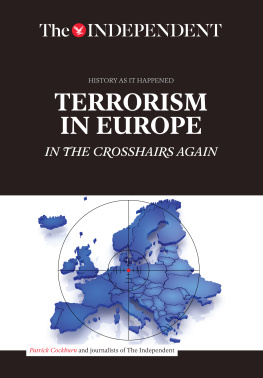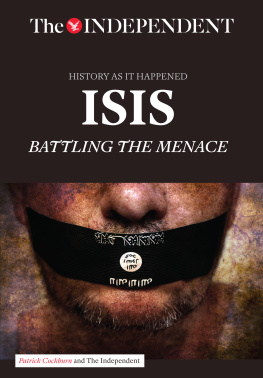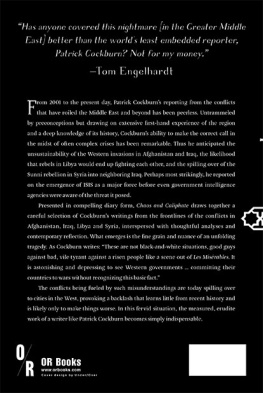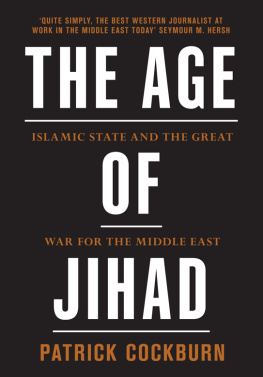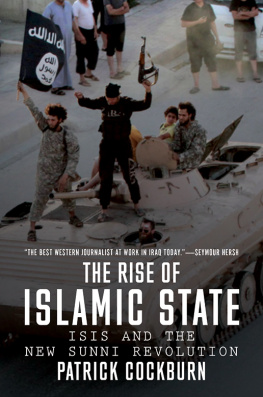Patrick Cockburn - The Jihadis Return: ISIS and the New Sunni Uprising
Here you can read online Patrick Cockburn - The Jihadis Return: ISIS and the New Sunni Uprising full text of the book (entire story) in english for free. Download pdf and epub, get meaning, cover and reviews about this ebook. year: 2014, publisher: OR Books, genre: Politics. Description of the work, (preface) as well as reviews are available. Best literature library LitArk.com created for fans of good reading and offers a wide selection of genres:
Romance novel
Science fiction
Adventure
Detective
Science
History
Home and family
Prose
Art
Politics
Computer
Non-fiction
Religion
Business
Children
Humor
Choose a favorite category and find really read worthwhile books. Enjoy immersion in the world of imagination, feel the emotions of the characters or learn something new for yourself, make an fascinating discovery.
- Book:The Jihadis Return: ISIS and the New Sunni Uprising
- Author:
- Publisher:OR Books
- Genre:
- Year:2014
- Rating:5 / 5
- Favourites:Add to favourites
- Your mark:
- 100
- 1
- 2
- 3
- 4
- 5
The Jihadis Return: ISIS and the New Sunni Uprising: summary, description and annotation
We offer to read an annotation, description, summary or preface (depends on what the author of the book "The Jihadis Return: ISIS and the New Sunni Uprising" wrote himself). If you haven't found the necessary information about the book — write in the comments, we will try to find it.
The Jihadis Return: ISIS and the New Sunni Uprising — read online for free the complete book (whole text) full work
Below is the text of the book, divided by pages. System saving the place of the last page read, allows you to conveniently read the book "The Jihadis Return: ISIS and the New Sunni Uprising" online for free, without having to search again every time where you left off. Put a bookmark, and you can go to the page where you finished reading at any time.
Font size:
Interval:
Bookmark:
Though capable of staging spectacular attacks like 9/11, jihadist organizations were not a significant force on the ground when they first achieved notoriety in the shape of al-Qaida at the turn of century. The Wests initial successes in the 2001 invasion of Afghanistan weakened their support still further.
Now thats all changed. Exploiting the missteps of the Wests wars in Afghanistan, Iraq and Libya, as well as its misjudgments in relation to Syria and the uprisings of the Arab Spring, the jihadis have won stunning victories leading to the creation of a caliphate stretching from the Sunni heartlands in Iraq through a broad swath of northeastern Syria.
The secular, democratic politics that were supposedly at the fore of the Arab Spring have been buried by the return of the jihadis. And, in all likelihood, the West will once again become a target.
How could things have gone so badly wrong? Writing in these pages with customary calmness and clarity, and drawing on his unrivaled experience as a reporter in the region, Cockburn analyzes the unfolding of one of the Wests greatest foreign policy debacles.

2014 Patrick Cockburn
Published by OR Books, New York and London
Visit our website at www.orbooks.com
First printing 2014
All rights reserved. No part of this book may be reproduced or transmitted in any form or by any means, electronic or mechanical, including photocopy, recording, or any information storage retrieval system, without permission in writing from the publisher, except brief passages for review purposes.
Cataloging-in-Publication data is available from the Library of Congress.
A catalog record for this book is available from the British Library.
ISBN 978-1-939293-59-6 paperback
ISBN 978-1-939293-60-2 e-book
Typeset by Lapiz Digital, Chennai, India.


Iraq has disintegrated. Little is exchanged between its three great communities Shia, Sunni, and Kurds except gunfire. The outside world hopes that a more inclusive government will change this but it is probably too late. The main victor in the new war in Iraq is the Islamic State of Iraq and the Levant (ISIS), which wants to kill Shia rather than negotiate with them. Iraq is facing a civil war that could be as bloody as anything that we have seen in Syria and could go on for years.
The crucial date in this renewed conflict is June 10, 2014, when ISIS captured Iraqs northern capital, Mosul, after three days of fighting. The Iraqi government had an army with 350,000 soldiers on which $41.6 billion had been spent in the three years since 2011, but this force melted away without significant resistance. Discarded uniforms and equipment were found strewn along the roads leading to Kurdistan and safety. The flight was led by commanding officers, some of whom changed into civilian clothes as they abandoned their men. Given that ISIS may have had as few as 1,300 fighters in its assault on Mosul, this was one of the great military debacles in history. Within two weeks those parts of northern and western Iraq outside Kurdish control were in the hands of ISIS. By the end of the month the new state had announced that it was establishing a caliphate reaching deep into Iraq and Syria. Its leader Abu Bakr al-Baghdadi said it was a state where the Arab and non-Arab, the white man and black man, the easterner and westerner are all brothersSyria is not for the Syrians, and Iraq is not for the Iraqis. The Earth is Allah's.
People in Baghdad are used to shocks after years of war, massacres, occupation, and dictatorship, but when Mosul fell they could feel the ground shifting under their feet. Soon ISIS fighters were only an hours drive north of a capital in which the streets, normally choked with traffic, grew quiet as people stayed at home because they thought it too dangerous to go out. This was particularly true of Sunni districts such as al-Adhamiyah on the east bank of the Tigris River, where young men rightly believed that if they passed through a checkpoint they were likely to be arrested or worse. People watched television obsessively, nervously channel hopping as they tried to tease out the truth from competing propaganda claims. The sense of crisis was made worse by the main government channel broadcasting upbeat accounts of the latest victories, though the claims were seldom backed up by pictures. Watch enough government television and pretty soon you would decide there is not a single member of ISIS in the country, said one observer.
The political geography of Iraq was changing before its peoples eyes and there were material signs of this everywhere. Baghdadis cook on propane gas because the electricity supply is so unreliable, but soon there was a chronic shortage of gas cylindersthey come from Kirkuk, and the road from the north had been cut by ISIS fighters. To hire a truck to come the 200 miles from the Kurdish capital Erbil to Baghdad now cost $10,000 for a single journey, compared to $500 a month earlier. There were ominous signs that Iraqis feared a future filled with violence as weapons and ammunition soared in price. The cost of a bullet for an AK-47 assault rifle quickly tripled to 3,000 Iraqi dinars, or about $2. Kalashnikovs were almost impossible to buy from arms dealers, though pistols could still be obtained at three times the price of the previous week. Suddenly, almost everybody had guns, including even Baghdads paunchy, white-shirted traffic police, who began carrying sub-machine guns.
Many of the armed men who started appearing in the streets of Baghdad and other Shia cities were Shia militiamen, some from Asaib Ahl al-Haq, a splinter group from the movement of Shia populist and nationalist cleric Muqtada al-Sadr. This organization is partly controlled by Prime Minister Nouri al-Maliki and, it is generally assumed, by the Iranians. It was a measure of the collapse of the state security forces and the national army that the government was relying on a sectarian militia to defend the capital. Ironically, one of Malikis few achievements as prime minister had been facing down the Shia militias in 2008, but now he was encouraging them to return to the streets. Soon dead bodies were being dumped at night. They were stripped of their ID cards but were assumed to be Sunni victims of the militia death squads. Iraq seemed to be slipping over the edge into an abyss in which sectarian massacres and counter-massacres might rival those during the sectarian civil war between Sunni and Shia in 20067.
The renewed sectarian violence was very visible: there was an appalling video of Iraqi military cadets being machine gunned near Tikrit by a line of ISIS gunmen as they stood in front of a shallow open grave. It reminded me of pictures of the SS murdering Jews in Russia and Poland during World War II. Human rights organizations using satellite pictures said they estimated the number of dead to be 170, though it might have been many more. Shia who were from the Turkoman ethnic group living in villages south of Kirkuk were driven from their homes and between 15 and 25 of them were murdered. It may be that the Shia will react in kind, but so far the killings have largely been of Shia by ISIS.
Font size:
Interval:
Bookmark:
Similar books «The Jihadis Return: ISIS and the New Sunni Uprising»
Look at similar books to The Jihadis Return: ISIS and the New Sunni Uprising. We have selected literature similar in name and meaning in the hope of providing readers with more options to find new, interesting, not yet read works.
Discussion, reviews of the book The Jihadis Return: ISIS and the New Sunni Uprising and just readers' own opinions. Leave your comments, write what you think about the work, its meaning or the main characters. Specify what exactly you liked and what you didn't like, and why you think so.

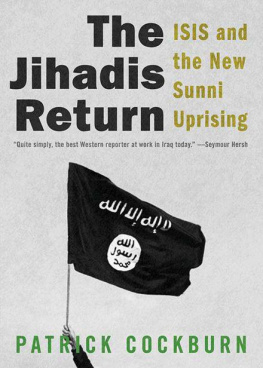
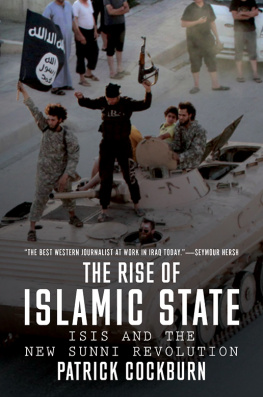
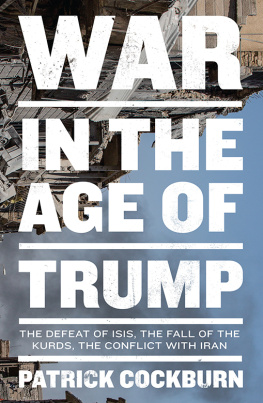
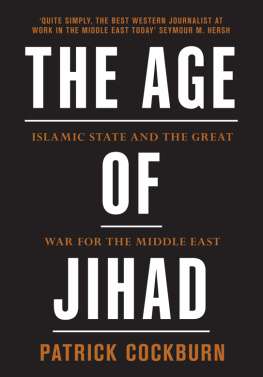

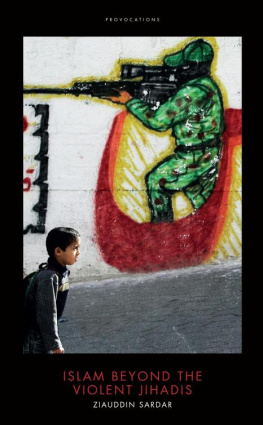
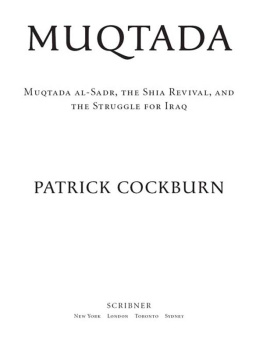
![Cockburn Patrick - Syria Burning: A Short History of a Catastrophe: [VersoUSAed]](/uploads/posts/book/207719/thumbs/cockburn-patrick-syria-burning-a-short-history.jpg)
